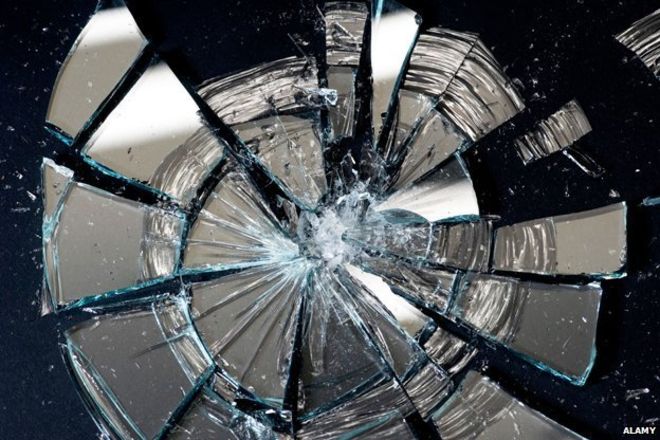UhGlass does flow.
If you visit so very old buildings in Europe the glass in windows has thickened at the base over centuries.
True fact!
By the way, the guy that wrote the article is not a rheologist.
UhGlass does flow.
If you visit so very old buildings in Europe the glass in windows has thickened at the base over centuries.
True fact!
By the way, the guy that wrote the article is not a rheologist.
Pls. If you had a crappily-made glass panel, would you install it thick end down or up?
I’ll stick with the opinion of one of the most famous glass researchers, factory and museum in the world. And others.
Pffft, everyone knows you’re a paid stooge of the corrupt global glazier cartel.
Go back to your fancy mansion with fancy windows that you paid for with your glass blood-money, glass-boy.
Careful George, you’ll get glassed.
Walking on, walking on broken glaaaaassssssss.
 Image copyrightALAMY
Image copyrightALAMY
The “glass delusion” is an extraordinary psychiatric phenomenon in which people believe themselves to be made of glass and thus liable to shatter. It peaked centuries ago but there are still isolated cases today, writes Victoria Shepherd.
The late medieval French King Charles VI was one of the most notable sufferers of glass delusion. He was reported to have wrapped himself in blankets to prevent his buttocks from breaking.
Instances of the delusion cropped up in medical encyclopaedias from across Europe. There were references in fiction - most notably Cervantes’ short story The Glass Graduate of 1613, in which the hero is poisoned by a quince intended as an aphrodisiac but which instead triggers a glass delusion.
Sufferers were seen to be normal in all ways bar the belief that they had turned to glass, and so could function, albeit anxious that other people shouldn’t come too close and risk shattering fragile limbs.
Image copyrightGETTY IMAGESImage captionCharles VI, King of France, wrapped himself in blankets
But in the 1830s, cases disappear from the records.
It’s easy to assume society and culture are so changed that mentally ill people would no longer manifest this particular delusion.
But Andy Lameijn, a psychiatrist from Leiden in the Netherlands, has uncovered contemporary cases. One case cropped up in his own hospital, offering him the chance to probe the meaning of this enigmatic delusion with a living patient. “It was an authentic case - it was unmistakable that it was a glass delusion.”
Lameijn’s research while director of the Endegeest Psychiatric Hospital in Leiden had led him to lost cases recorded after the 1830s. A lecture of 1883 from the archives in a Edinburgh mental hospital cited the symptoms of 300 female patients, one of whom thought her legs were made of glass.
Media captionGlass delusion
Another case from the 1880s turned up in the footnotes to an edition of Cervantes’ The Glass Graduate, referring to a contemporaneous case having occurred in an asylum in Paris, but with no further details.
Lameijn wrote and lectured on the subject, and was approached by a fellow psychiatrist who had found a case in the archives of his own Dutch hospital which dated back to the 1930s. The woman had been admitted to a psychiatric hospital believing that her legs and back were made of glass. Such was her fear of personal contact, the notes showed, that the nurses couldn’t get near her to change her clothes or help her. She had apparently recovered after treatment. Another doctor brought him a case from a different hospital, from 1964.
But then a young man turned up at the University Clinic in Leiden, claiming to be made of glass. “I really dropped everything,” Lameijn recalls, “I didn’t want to miss this.” He was to have the opportunity to speak to the only contemporary person to present with glass delusion for decades.
That’s me. I’m there, and I’m not there. Like the glass in the window
Lameijn talked for several hours to the man, who confirmed that he felt that he was made of glass. Lameijn asked what this feeling meant to him, not wanting to distort the conversation by suggesting ideas of fragility or transparency, and after initial reticence, the patient began to open up.
He pointed to the window in the consulting room and asked Lameijn what he could see. Lameijn replied that he could see a street, some cars, more buildings, people walking past, and waited.
The patient said: “Ah! You’ve missed the glass in the window. You didn’t see it. But it is there.” He leaned forward, and said: “That’s me. I’m there, and I’m not there. Like the glass in the window.”
 Image copyrightTHINKSTOCK
Image copyrightTHINKSTOCK
The conversation continued and the patient expanded on his feeling of being made of glass, claiming that he was able to turn this feeling of being “there” and “not there” on and off at will, like a switch in his own mind - he could “disappear” and “reappear”.
It transpired that the patient had recently had an accident, and Lameijn began to formulate a theory as to why a modern person might present with glass delusion. His conclusion was that the man in question was using this glass delusion as a sort of distance-regulator - following the accident, his family had become over-protective, and the glass delusion was an attempt to regain privacy and hide from overbearing family.
The Glass Delusion is broadcast on BBC Radio 4 at 11am BST on Friday 8 May 2015
There are reasons why someone with mental illness in the Middle Ages - or indeed the 17th Century - might manifest glass delusion. That was a time when clear glass was a new material on the scene, seen as magical, alchemical even.
Why might glass delusion reappear at a time when glass is no longer new? What contemporary psychological resonance might it have?
Psychoanalyst Adam Phillips argues that the glass delusion has powerful contemporary resonance in a society in which anxieties about fragility, transparency and personal space are pertinent to many people’s experience of, and anxieties about, living in the modern world.
 Image copyrightTHINKSTOCK
Image copyrightTHINKSTOCK
Image captionCement delusions appeared in the 19th Century
The feeling of being made of glass could be a useful way of understanding how we negotiate society, a society that is increasingly crowded, in which modern technological advances isolate us and offer apparently boundary-less communication.
Novelist Ali Shaw, author of The Girl with Glass Feet, suggests that glass delusion might simply be at the extreme end of a scale of social anxiety which many of us experience to a lesser extent. The fear of tripping and breaking is really an exaggerated fear of social humiliation.
Prof Edward Shorter, a historian of psychiatry from the University of Toronto, suggests that it is the relative newness of clear glass as a material in 17th Century Europe which holds the key to understanding the disorder. Throughout history, Shorter argues, the inventive unconscious mind has pegged its delusions on to new materials and the technological advances of the age.
In the 19th Century cement delusions appeared at a time when cement emerged as a new building material, just as common delusions of recent decades include the false belief that the CIA or other security services can download thoughts through micro-transmitters, that people could “read your mind”.
Glass is not new, but it certainly still has the power to captivate, and could reflect aspects of people’s fears and wishes as they negotiate the modern world.
Don’t worry…we’ve seen straight through him.
Generally, a masters or PhD in a science based field of study.
I’m of the old school where I think if you don’t have one of those your not really a scientist (sorry if I offend anyone) I’m nearly finished a science degree in atomsphere and satellite systems but I’m not going to run around and call myself a scientist after doing so.
All of them were tasty.
The correct response is “the wife’s fine, but the kids are dullards*”.
*the word “dullards” has been inserted to replace a less PC term.
Humans norms are unfamiliar to me. Noting this I shall watch, and learn, and speak not of the tasties.
You know he’s not a scientist yeah?
Of course I know but doesn’t stop the warmest movement from using him as a source for propaganda along with Al Gore, remember him? An Inconvenient Truth.
Richard Branson, Leonardo DeCaprio, John Travota Tom Cruise and the whole raft of attention seeking celebrities.
Pachuri the pervert, head of the IPPC was an engineer and not a scientist.
Michael E Mann is a scientist, A.B. applied mathematics and physics (1989), MS physics (1991), MPhil physics (1991), MPhil geology (1993), PhD geology & geophysics (1998).
A scientist who thinks the best way to construct a climate model is to cut down 33 trees ignore 32 of them and select one to prove his point.
And of course there is the scientist Tim Flannery, palaeontologist, mammologist, government grants collector and prophet, i don’t know how good he was at bone collecting but he was really good at screwing others out of $90 million for cheap, clean renewable hot rocks technology that didn’t work.
Makes you wonder how Sydney has got along without water since 2007.
Exactly.
All you morons have to hang onto in this is non experts.
I’ve lost count of the times I’ve quoted John Travolta.
But only about your admiration for Scientology.
I do like reading the replies to this post.




Scary is the 2.6k likes!
To be fair I have also quoted Flannery and Manne and his corruption and repression of his methods on a number of occasions but still no rebuttal from you.
Haven’t quoted them either, but I take your point.
Flannery to me is a biologist, and a sort of fringe one at that. Engaging when he speaks, but I need more than that for buy-in.
Good god.
Surely people aren’t still denying CC?
Are they?
I thought Flannery’s predictions enabled and encouraged denialists for years.
It was never going to rain again, and he was nowhere near qualified to make these predictions.
I thought Flannery’s predictions enabled and encouraged denialists for years.
It was never going to rain again, and he was nowhere near qualified to make these predictions.
Flannery is a paleoecologist, and a really really good one. He is exceptionally qualified to discuss exactly what impact a given amount of climate change would have on animals and vegetation. As such, he is a perfectly reasonably person to involve in a scientific conversation about the likely impacts of climate change, what temperature targets need to be set, etc etc. He’s not an a atmospheric science or oceanography expert and in the normal course of academia he shouldn’t be involving himself in debates on that subject, but in his role as head of the climate council (appointed by howard) he often kinda had to. And if they’d appointed an atmospheric scientist to the role instead, that person would be just as out of their field if they’d ever had to publicly talk about the impact of climate change on agriculture or fauna or whatever. Nobody’s an expert on everything.
Flanery is an odd guy, by many reports. Some people say he’s an absolute prick to work with in the field at times, some reckon he’s awesome, but he’s a very good scientific communicator. If you have’t read The Future Eaters, you need to, it’s THE towering work of Australasian ecological history even if it’s getting a bit long in the tooth now and hasn’t kept up with more recent fossil discoveries. But I think his expertise in his field leads him to despair. He knows what’s gonna happen if the world heats up much more, and he gets more and more frantic, which leads him to overstate things or step out of his personal field of expertise or make dumb political mistakes out of pure passion, which are inevitably leapt upon by the professional denialists and liars at the IPA and Murdoch press and the mining industry and so on, in an attempt to discredit the entire field by bashing one guy.
It’s an odd reversal of the situation with Gore in the states. Gore never claimed to be a scientist, he was just doing the philanthropy thing that many retired presidents/vice presidents do after leaving politics. It’s just that he chose environmental issues as his area to focus on, and the republicans hated him so much (and knew that he’d been robbed of the election) that they bent their entire efforts on bashing the field of climate science in order to discredit Gore. Which was actually a turn for them - the Rs were never actively anti-environment until relatively recently. Nixon did a huge amount for national parks and to prevent the overuse of pesticides, and even Reagan was instrumental in setting up the amazingly successful global cap & trade scheme that eliminated CFC use in order to protect the ozone layer. But as soon as Gore took up climate as an issue, the Republicans reflexively started to destroy it simply because they disliked him, and when they did, they got so much support from the oil companies etc who’d been trying to bury the issue for decades that they never looked back.